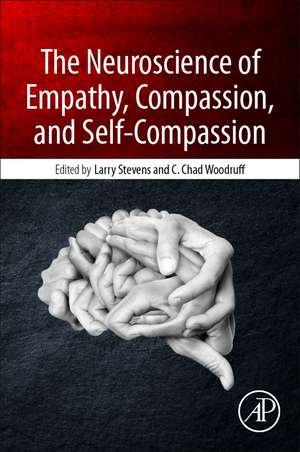The Neuroscience of Empathy, Compassion, and Self-Compassion
Editat de Larry Charles Stevens, C. Chad Woodruffen Limba Engleză Paperback – 21 iun 2018
- Provides perspectives on empathy, compassion and self-compassion (ECS), including discussions of cruelty, torture, killings, homicides, suicides, terrorism and other examples of empathy/compassion erosion
- Addresses autonomic nervous system (vagal) reflections of ECS
- Discusses recent findings and understanding of ECS from mirror neuron research
- Covers neuroendocrine manifestations of ECS and self-compassion and the neuroendocrine enhancement
- Examines the neuroscience research on the enhancement of ECS
- Includes directed-meditations (mindfulness, mantra, Metta, etc.) and their effects on ECS and the brain
Preț: 354.19 lei
Preț vechi: 455.22 lei
-22% Nou
Puncte Express: 531
Preț estimativ în valută:
67.78€ • 70.36$ • 56.52£
67.78€ • 70.36$ • 56.52£
Carte tipărită la comandă
Livrare economică 15-29 martie
Livrare express 18-22 februarie pentru 64.82 lei
Preluare comenzi: 021 569.72.76
Specificații
ISBN-13: 9780128098370
ISBN-10: 0128098376
Pagini: 353
Dimensiuni: 152 x 229 x 22 mm
Greutate: 0.47 kg
Editura: ELSEVIER SCIENCE
ISBN-10: 0128098376
Pagini: 353
Dimensiuni: 152 x 229 x 22 mm
Greutate: 0.47 kg
Editura: ELSEVIER SCIENCE
Public țintă
Upper-level undergraduate and graduate students and researchers in psychology, cognitive science, and neuroscience.Cuprins
1. What Is This Feeling That I Have for Myself and for Others? Contemporary Perspectives on Empathy, Compassion, and Self-Compassion, and Their Absence
2. The Brain That Makes Us Concerned for Others: Toward a Neuroscience of Empathy
3. The Brain that Longs to Help Others: The Current Neuroscience of Compassion
4. The Brain That Longs to Help Itself: The Current Neuroscience of Self-Compassion
5. Sometimes I Get So Mad I Could …: The Neuroscience of Cruelty
6. Reflections of Others and of Self: The Mirror Neuron System’s Relationship to Empathy
7. Why does it feel so good to care for others, but only sometimes for myself?
8. Can We Change Our Mind About Caring for Others? The Neuroscience of Systematic Compassion Training
9. Compassion Training from an Early Buddhist Perspective: The Neurological Concomitants of the Brahmavihāras
10. The Language and Structure of Social Cognition: An Integrative Process of Becoming the Other
11. Where Caring for Self and Others’ Lives in the Brain, and How it can be Enhanced, and Diminished: Observations on the Neuroscience on Empathy, Compassion, and Self-Compassion
2. The Brain That Makes Us Concerned for Others: Toward a Neuroscience of Empathy
3. The Brain that Longs to Help Others: The Current Neuroscience of Compassion
4. The Brain That Longs to Help Itself: The Current Neuroscience of Self-Compassion
5. Sometimes I Get So Mad I Could …: The Neuroscience of Cruelty
6. Reflections of Others and of Self: The Mirror Neuron System’s Relationship to Empathy
7. Why does it feel so good to care for others, but only sometimes for myself?
8. Can We Change Our Mind About Caring for Others? The Neuroscience of Systematic Compassion Training
9. Compassion Training from an Early Buddhist Perspective: The Neurological Concomitants of the Brahmavihāras
10. The Language and Structure of Social Cognition: An Integrative Process of Becoming the Other
11. Where Caring for Self and Others’ Lives in the Brain, and How it can be Enhanced, and Diminished: Observations on the Neuroscience on Empathy, Compassion, and Self-Compassion
